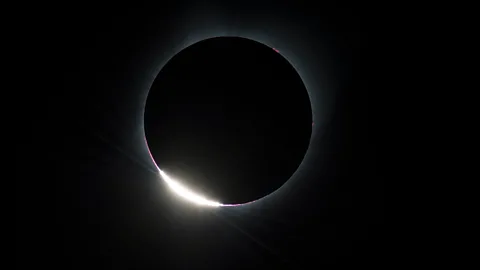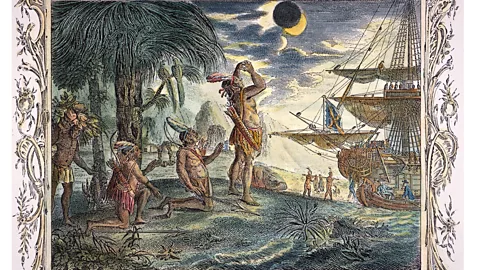How eclipses have shaped history

 Getty Images
Getty ImagesEvery so often, an eclipse has changed the course of pivotal events – for better and worse.
In one of the first widely read novels about time-travel, published in 1889, Mark Twain wrote about a man whose life was saved by an eclipse.
In Twain's story, A Connecticut Yankee in King Arthur's Court, the protagonist Hank Morgan is knocked unconscious and wakes up in 6th-Century England. He soon finds himself in trouble, and is sentenced to be burned at the stake.
Luckily for him, his execution is scheduled for the same day as an eclipse. Knowing it's coming up, Morgan tricks the King and his people into believing he controls the Sun and Moon. His foreknowledge wins him a pardon.
It's a fictional story, but it may have been inspired by real-world events. Explorer Christopher Columbus once did something similar, and it may well have saved his life. Indeed, throughout history, various eclipses have happened at pivotal points: influencing people's decisions, changing the outcome of battles, and even transforming what we once believed about the nature of the Universe.
You may also like:
Eclipses have influenced humanity in many ways, becoming entwined with myriad cultures, belief systems and mythology. Over the centuries, people have associated these cosmic events with gods, transcendental forces, demons, and a surprising menagerie of animals. In western Asia, for example, it was a dragon devouring the Sun, in Peru it was a puma, some Native Americans talked of a hungry bear, and the Vikings saw a pair of sky wolves (Read more: If you think an eclipse means doomsday, you're not the first.)
But occasionally, an eclipse can actually change the course of historical events.
 Getty Images
Getty ImagesOne of the earliest known examples of an eclipse provoking a different outcome was during a battle more than 2,000 years ago, explains writer Mark Littmann of the University of Tennessee, Knoxville, who co-authored the book Totality: The Great North American Eclipse of 2024.
Writing in 430BC, the Greek historian Herodotus told of a war between the Lydians, who occupied regions of modern-day Turkey, and the Medes, an ancient Iranian people. After six years of fighting, with stalemates, victories and losses on both sides, the opponents met again. This time, however, "day suddenly changed into night," wrote Herodotus. "The Medes and Lydians, when they observed the change, ceased fighting, and were alike anxious to have terms of peace agreed on."
In the 1800s, astronomers pinpointed that Herodotus must have been describing a solar eclipse on 28 May 585BC, says Littman.
Another account by Herodotus described how Xerxes, the leader of the Persian army, saw an eclipse before invading Greece. It's unclear exactly which one he could have seen that year, says Littmann, but if Herodotus's telling is to be trusted, Xerxes was alarmed enough to consult his Zoroastrian priests. They told him God was warning the Greeks about their cities' imminent destruction. "'The Sun foretells for them, and the Moon for us'," they supposedly suggested.
"Xerxes, thus instructed, proceeded on his way with great gladness of heart," Herodotus wrote.
It turned out to be terrible advice. Xerxes successfully attacked Athens, but after his navy was destroyed, he was forced to withdraw. On returning, his armies were crushed. Then in 465BC, he was assassinated.
Cosmic coincidences
We accept total solar eclipses as part of life on this planet, but if the Solar System had formed differently, they wouldn't happen. The Sun is 400 times the diameter of the Moon, while also sitting about 400 times further from the Earth, so the two appear the same size in the sky. It's quite the coincidence.
In his co-authored book Totality, Mark Littmann points out that if the Moon was just 273km (169 miles) smaller in diameter, or it were further away, people would never see the kind of total eclipse that will cross the Americas in April next year. Instead, eclipses would be more like the annular eclipse expected this Saturday, which happens when the Moon is slightly more distant from the Earth. This may eventually happen as the Moon is edging further away every year.
It wouldn't be the last time an eclipse proved pivotal though.
Fast forward more than a thousand years, and Christopher Columbus was on his final voyage. In 1503, he beached his sinking ships on Jamaica with his crews in despair, most of his anchors lost, and his vessels worm-eaten enough to be "as full of holes as a honeycomb", according to one biographer. Fearing both starvation and conflict, Columbus forbid his crew from leaving their base, and tentatively traded Spanish trinkets and jewellery for food and water with the people living there.
Danger was always present – one of his scout parties was overpowered and captured by hostile locals when investigating Jamaica's easternmost point. To make matters worse, in January 1504, some of the crew mutinied and fled onto the island. They abused and mocked the island residents, stole provisions, and "committed every possible excess", wrote Columbus' biographer.
After weeks of this, the locals lost their patience. Tolerance gave way to contempt and hatred, and the trade of food ceased. Columbus and the remaining crew faced imminent starvation.
But as the end beckoned, Columbus remembered an astronomical event was approaching: a lunar eclipse. On 1 March, he gathered leaders of the local communities, reproached them for withdrawing provisions, and warned them: "The God who protects me will punish you… this very night shall the Moon change her colour and lose her light, in testimony of the evils which shall be sent on you from the skies."
It worked. The fearful locals relented, providing food again. Columbus promised to perform a rite that would "pardon" them.
Through modern eyes, it's a troubling story. The indigenous people probably had every right to shun the marauding Europeans, and it was hardly ethical diplomacy to use scientific knowledge and fake threats to get his way.
 Alamy
AlamyBut nonetheless, it raises the question of what would have happened to Columbus if the lunar eclipse had not happened that March. Rescue would not arrive until June. Perhaps it would have been better for his reputation if he had perished on Jamaica. The remainder of his life was hardly glorious: he returned to Spain in poor physical and mental health, agitating for official recognition and money. His patrons doubted his mental condition and ignored his demands. He lived unhappily until his death in 1506.
Intriguingly, lunar eclipses like Columbus's seem more likely to crop up at pivotal moments than solar eclipses, says Littmann. Why? It's due to the number of people that can see them. While there are more solar eclipses, lunar eclipses last longer and are visible for more than half the Earth. "It's easier for them to influence history," he explains.
Tecumseh's eclipse
However, a solar eclipse did play an important role in US history. In the 1800s, the Native American Shawnee leader Tecumseh and his brother, a self-styled prophet, were seeking to unite their people and maintain traditional ways.
The appointed governor of the territory, William Henry Harrison – a future US president – had other ideas, and began persuading leaders to hand over their land. He knew Tecumseh and his brother stood in the way, so – hoping to discredit them – asked them for a sign: if the prophet was so powerful, why not stop the Sun in the sky?
Where and when will the next eclipses be?
Parts of the Americas will see an annular solar eclipse on Saturday – a so-called "ring of fire" caused when the Moon doesn't quite obscure the Sun. But the big one, a total solar eclipse, will be in April 2024, passing over Canada, many US states and Central America. The next total eclipse to come to the US won't be until 2033, and only visible from Alaska.
In 2026, western Iceland will see a total eclipse, as will Spain, which will get a second in 2027. After that, it's Australia's turn. It will be treated to four between 2028 and 2038.
The next total lunar eclipse, meanwhile, will be in early 2025, for much of Asia, as well as parts of Africa and Australia.
It backfired. Tecumseh's brother announced that the Sun would stand still on 16 April 1806. "At the proper moment, he walked out in full regalia and pointed at the Sun and said, 'go dark'," says Littmann.
It's unclear how Tecumseh and his brother knew there would be an eclipse that day. But it was certainly effective, cementing the siblings' influence and reputation among their people. "The Shawnee did not need that kind of proof, but it certainly didn't help William Henry Harrison's effort," says Littmann.
Sadly, the longer-term consequence in the history books was a return to warfare.
Relative benefits
For Littmann, the most historically consequential eclipse, however, came in the early 20th Century: the one in 1919 that proved Albert Einstein right about general relativity, and made him one of the most famous scientists in the world.
"To my mind, that was the real influence on world history. That was a turning point, in terms of science, in terms of our understanding of the Universe, and people's attitudes," says Littmann. "The Universe is a good deal harder understand than we supposed in the time of Newtonian physics."
In a nutshell, the solar eclipse of 1919 allowed scientists to see that the Sun's gravity was bending starlight, a key prediction of Einstein's.
To understand more about this consequential eclipse, watch this video:
Will these be the last eclipses to steer history? Probably not. There are plenty more candidates over the next decade or so (see the box further up this article entitled: "When and where will the next eclipses be?"). But while the paths of the Earth and Moon can now be easily predicted, how people on Earth will react when they cross cannot.
* Richard Fisher is a senior journalist for BBC Future. Twitter: @rifish
--
